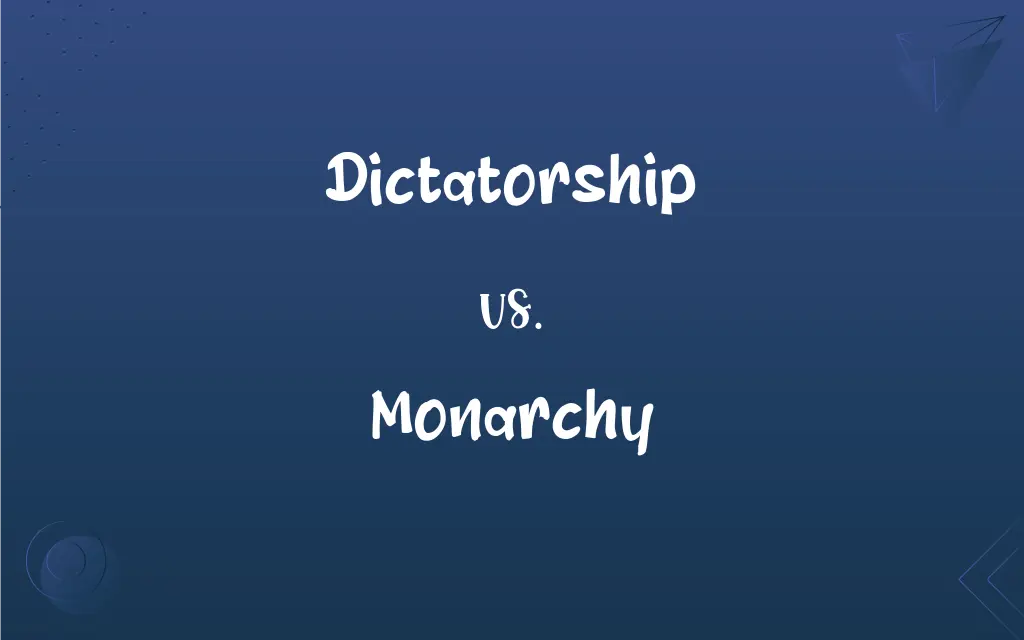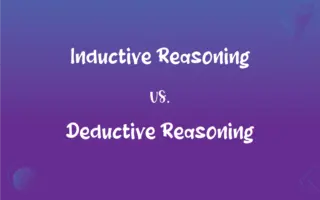Dictatorship vs. Monarchy: What's the Difference?
Edited by Aimie Carlson || By Janet White || Published on November 25, 2023
Dictatorship is a government led by a single leader with absolute power, often acquired by force. Monarchy is a government led by a monarch, typically hereditary, with varying degrees of power.

Key Differences
Dictatorship involves a single leader who exercises absolute control over the state, often without the consent of the governed. While, monarchy refers to a form of government where a monarch (king, queen, or emperor) rules, usually inheriting their position.
In a dictatorship, the dictator often gains power through force or manipulation, lacking democratic legitimacy. Monarchy, however, usually follows hereditary succession lines, with the ruler's position often being a birthright.
Dictatorships are characterized by the lack of political pluralism and often suppress opposition and control media. Whereas, monarchies can range from absolute, where the monarch has total control, to constitutional, where their powers are limited by law.
The leadership in a dictatorship is typically centralized in one individual, who may not be accountable to the populace. Meanwhile, in a monarchy, the monarch might be a ceremonial figurehead or have real political power, depending on the system.
Human rights violations and suppression of dissent are commonly associated with dictatorships. While, monarchies, especially constitutional ones, can coexist with respect for civil liberties and democratic processes.
ADVERTISEMENT
Comparison Chart
Basis of Power
Often seized or consolidated by force
Typically hereditary
Government Structure
Centralized in one individual
Led by a monarch, may have other governing bodies
Political Pluralism
Usually none, with suppression of opposition
Varies, from absolute to constitutional with democratic elements
Human Rights Record
Often poor, with widespread abuses
Varies, better in constitutional monarchies
Legitimacy
Lacks democratic legitimacy
Often seen as legitimate due to tradition and law
ADVERTISEMENT
Dictatorship and Monarchy Definitions
Dictatorship
A form of government where political authority is monopolized.
The dictatorship controlled every aspect of public life.
Monarchy
A state ruled by a king, queen, or emperor.
In the monarchy, the queen played a largely ceremonial role.
Dictatorship
A government controlled by one person with absolute power.
The dictatorship suppressed all forms of political dissent.
Monarchy
A form of government with a monarch at the head.
The monarchy had been established for over three centuries.
Dictatorship
A regime where power is concentrated in the hands of a single ruler.
Under the dictatorship, media freedom was nonexistent.
Monarchy
A system where a royal family symbolizes the country's national identity.
The monarchy was a key part of the nation's cultural heritage.
Dictatorship
A system where a dictator rules without democratic processes.
The dictatorship came to power after a military coup.
Monarchy
Often based on hereditary rule and traditional legitimacy.
Succession in the monarchy was determined by birthright.
Dictatorship
Characterized by authoritarian rule and lack of civil liberties.
Human rights were severely curtailed during the dictatorship.
Monarchy
Can be absolute or constitutional, depending on the monarch's power.
The constitutional monarchy divided powers between the king and parliament.
Dictatorship
The office or tenure of a dictator.
Monarchy
Government by a monarch.
Dictatorship
A state or government under dictatorial rule.
Monarchy
A state ruled or headed by a monarch.
Dictatorship
Absolute or despotic control or power.
Monarchy
A government in which sovereignty is embodied within a single, today usually hereditary head of state (whether as a figurehead or as a powerful ruler).
An absolute monarchy is a monarchy where the monarch is legally the ultimate authority in all temporal matters.
A constitutional monarchy is a monarchy in which the monarch's power is legally constrained, ranging from where minor concessions have been made to appease certain factions to where the monarch is a figurehead with all real power in the hands of a legislative body.
Dictatorship
A type of government where absolute sovereignty is allotted to an individual or a small clique.
Dictatorship
A government which exercises autocratic rule.
Dictatorship
Any household, institution, or other organization that is run under such sovereignty or autocracy.
Dictatorship
The office, or the term of office, of a dictator; hence, absolute power.
Dictatorship
A form of government in which the ruler is an absolute dictator (not restricted by a constitution or laws or opposition etc.)
FAQs
Can a monarchy transition to a dictatorship?
Historically, this has happened when a monarch consolidates absolute power.
Is a dictatorship always autocratic?
Typically, yes, with power centralized in one leader.
Do monarchies always follow a hereditary line?
Mostly, but there are exceptions and variations in succession laws.
Can a dictator be overthrown?
Yes, through coups, revolutions, or external interventions.
Are dictatorships recognized internationally?
They can be, but often face criticism for their human rights record.
Can monarchies uphold democratic values?
Yes, particularly in constitutional monarchies.
Can a monarchy be abolished?
Yes, through revolution, referendum, or legislative action.
Are all dictatorships military-based?
Not all, but many have military origins or support.
Do dictatorships have political parties?
If they do, they're often for show, with the dictator's party dominating.
How does a dictatorship differ from a monarchy in terms of power acquisition?
A dictator often seizes power, while a monarch usually inherits it.
Can a monarchy have elected elements?
Yes, especially in constitutional monarchies with democratic institutions.
How do monarchies impact culture?
Monarchies often play a significant role in national cultural identity.
Do dictatorships engage in international diplomacy?
Yes, though they may face challenges due to their domestic policies.
Are dictatorships inherently unstable?
They can be, due to lack of legitimate public support and potential for internal conflict.
Is a constitutional monarchy a democracy?
It can be part of a democratic system, with the monarch having limited power.
Do dictatorships have constitutions?
Some do, but these are often not adhered to or are manipulated to suit the dictator.
How does succession work in a monarchy?
Usually through hereditary lines, though laws vary by country.
Are there modern examples of absolute monarchies?
Yes, but they are increasingly rare compared to constitutional ones.
Is there public participation in a dictatorship?
Very limited, as political opposition and free elections are usually suppressed.
Can a monarchy be part of a federal system?
Yes, as seen in some constitutional monarchies.
About Author
Written by
Janet WhiteJanet White has been an esteemed writer and blogger for Difference Wiki. Holding a Master's degree in Science and Medical Journalism from the prestigious Boston University, she has consistently demonstrated her expertise and passion for her field. When she's not immersed in her work, Janet relishes her time exercising, delving into a good book, and cherishing moments with friends and family.
Edited by
Aimie CarlsonAimie Carlson, holding a master's degree in English literature, is a fervent English language enthusiast. She lends her writing talents to Difference Wiki, a prominent website that specializes in comparisons, offering readers insightful analyses that both captivate and inform.































































